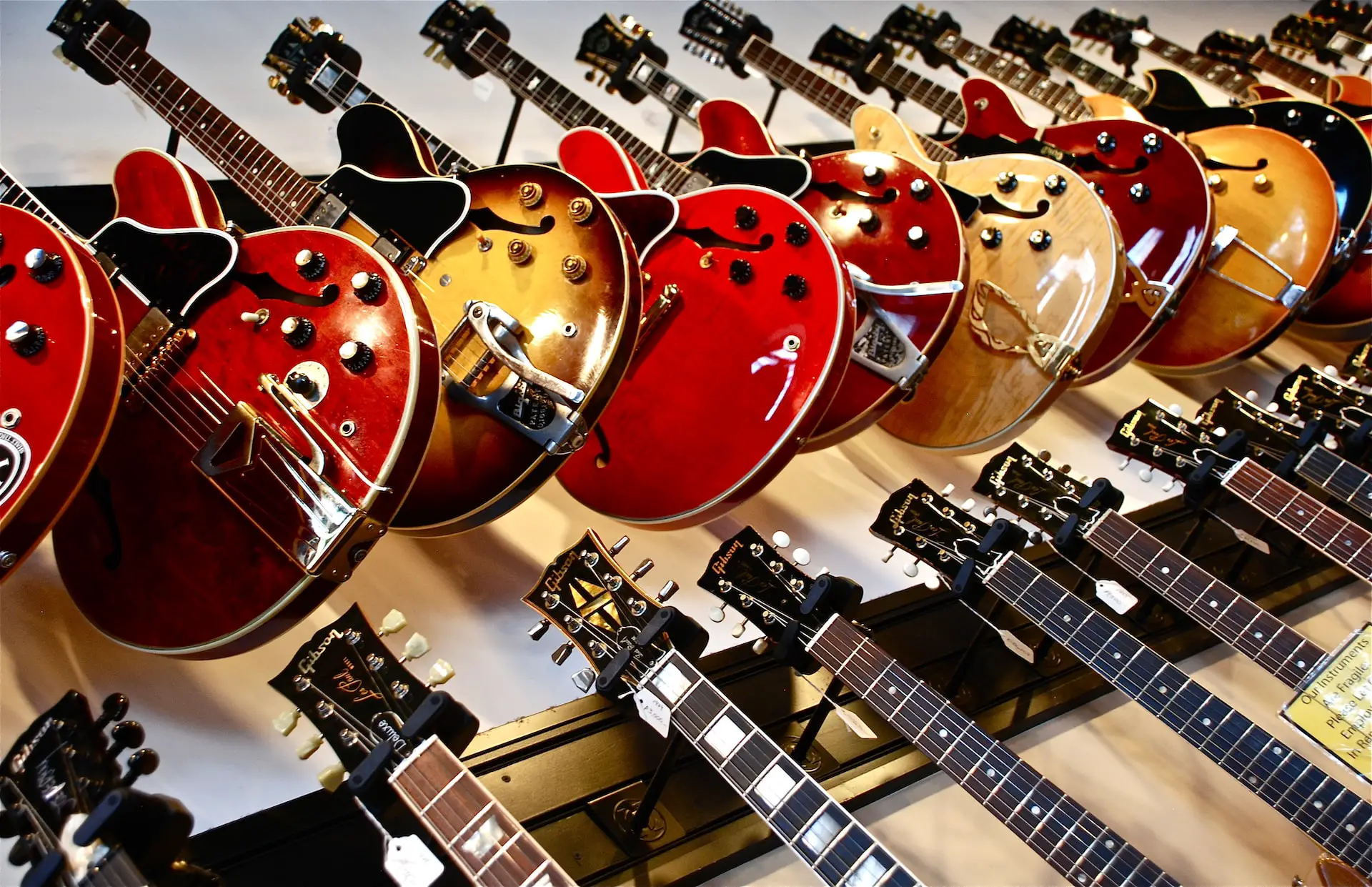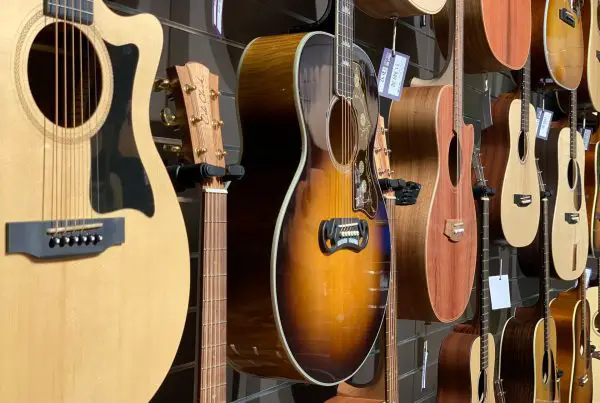There are definitely advantages to playing a nicer, more expensive guitar than a cheaper one. While a more expensive, higher-quality guitar is nicer to play, that in and of itself will not make you a better guitar player. However, plenty of options are available to get the highest quality guitar you can for your budget.
As someone who has played the guitar for over seven years now, I have played all types of guitars and basses of all different price ranges and quality ranges, so I also know that finding a high quality guitar at an affordable price can be a challenge as well. It is also possible with a bit of time and research.
In this article, we will cover several topics in more detail. These topics will include things such as are nicer (more expensive guitars) easier to play, do expensive guitars really sound better, and do better guitars make you play better.
We will also go into detail about the specific information and components of both cheap and expensive guitars, if it is worth upgrading a cheap guitar with nicer parts (when applicable), and what type of guitar is easiest to play.
Also Read: Expensive Guitar Straps: 4 Reasons Why It & Worth It (+FAQ)
Are Nicer (More Expensive) Guitars Easier to Play
Electric Guitars
A nicer, more expensive guitar is generally easier to play because it is built with higher-quality components and is constructed better than cheaper instruments.
The higher-quality components and the lack of flaws in the design of higher-quality guitars make them easier to play (generally speaking).
Nicer guitars are also usually designed with better action. Action refers to the distance between the strings and the frets on the neck of your guitar. The lower the action on the guitar, the easier it is to push the strings down to create the notes and chords you are going for.
When playing guitar, keeping the right beat is essential. Playing the guitar with a lower action will not only make it easier to form the notes and chords you want, but you will also be able to move your hand and your fingers more quickly.
Additionally, a nicer, more expensive guitar feels better when holding it. The better feeling you will get from holding and playing a higher-quality guitar will create an easier overall feeling when you are playing it.
Bass
More expensive bass guitars are also generally easier to play. This is because it’s built with better parts and its tuned better. For example, lower action and even frets.
Playing a bass requires the ability to stretch your left hand out a bit further (assuming you are forming notes and chords with your left hand). This makes playing a bass with better action much easier since you will be stretching your fingers out more playing bass than guitar.
A bass generally is designed to handle more pressure and stress from the strings it holds, as they are thicker than guitar strings. Having higher-quality tuning pegs and a bridge will contribute to a better overall feeling when you are playing it.
Acoustic Guitars
A nicer, more expensive acoustic guitar is also easier to play than a cheaper acoustic guitar. Even though an acoustic guitar usually includes fewer electric components than an electric guitar does, the quality will still make a difference.
The type of wood that an acoustic guitar is composed of will make a massive difference in the quality of the sound you produce, so this is a huge factor when picking out an acoustic guitar as well.
The action on the acoustic guitar is usually a bit higher than it is on electric guitars. So, playing an acoustic guitar with the best action possible should be a priority.
Do Expensive Guitars Really Sound Better?

Expensive guitars sound better
Expensive guitars really do sound better – when you play an expensive, higher-quality guitar, your playing will result in a much nicer tone.
One major factor that will result in an expensive guitar sounding better is the wood. Regardless of whether the guitar is an electric, acoustic, or even a bass, the type of wood the guitar is manufactured from will influence the instrument’s tone.
Two of the most popular woods for high-quality guitars (acoustic or electric) and bass are mahogany and rosewood. This is mainly subject to opinion. I recommend playing guitars designed from both types of wood to see which sounds better.
Additionally, more expensive guitars will have better and higher-quality tuning pegs, nuts, and bridges. These parts are usually assembled more solidly in higher-quality guitars, creating a better overall sound.
Also Read: 4 Factors That Affect Guitar Intonation: Tips For Best Tone
Do Better Guitars Make You Play Better?

An expensive guitar surely makes you play better
Better guitars is much nicer to play with but it won’t significantly improve your playing skills at all. If you don’t practise regularly and still a beginner, then expensive guitars will not help.
Expensive guitars do not have magical powers. An experienced guitarist will sound better playing a cheaper lower-quality guitar than an inexperienced guitar player playing a higher-quality guitar will.
Even though a higher-quality guitar does not have magical powers, there is still a placebo effect type of influence here.
If you start sounding better because you are playing a higher-quality guitar than you used to, this can help you to create a positive belief that you are a better guitar player.
To find the best option for you, visit your local guitar store and experiment with all types of guitars until you find the best option.
Many beginning guitarists struggle with the dilemma of whether it is worth it to invest in a higher-quality guitar or not.
The best option is to shoot for the sweet spot of the guitar being of a high enough quality that you will still be inspired to continue playing regularly (so that you can improve) but not so expensive that it will break the bank.
Expensive Guitar Vs. Cheap: What Makes Expensive Guitar Better?
1. Better Pickups
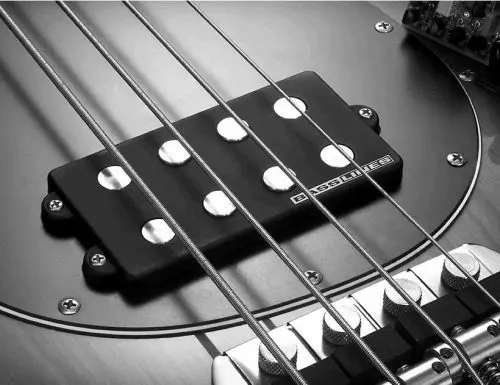
Higher-quality guitars will have higher-quality pickups. The better pickups are usually active as opposed to passive. A passive pickup will pick up the vibration of your strings and reactively transfer the signal through the internal wiring through the cord to the amplifier.
An active pickup will also transfer the signal of your vibrating strings. However, active pickups are also battery-powered, so they will pick up the vibrations quickly and have a better overall sound than a passive pickup will.
Also Read: Does Guitar Pickup Matter? Sound Difference On Type & Price
2. Better Strings
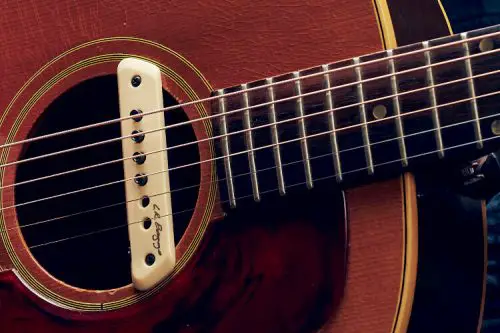
Soundhole pickup
A high-quality guitar will usually come with better strings on it already. However, the good news is that you can still put high-quality strings on a lower-quality guitar.
The strings are the least expensive and the most often replaced part of any guitar, regardless of its quality.
Also Read: 7 Simple Ways To Make Guitar Strings Easier To Press
3. Better Wood
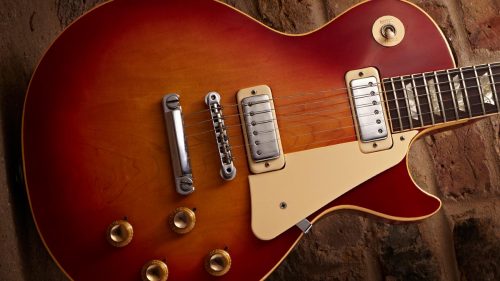
Two of the most popular types of wood for high-quality guitars are mahogany and rosewood. Here are a few other types of wood that are found in high-quality guitars as well:
- Maple
- Sitka Spruce
- Koa
- Cedar
However, the type of wood alone will not necessarily make a guitar better quality. It will also depend on how the guitar is constructed. This brings us to the next trait, solid top vs. laminate top.
4. Solid top vs. Laminate top
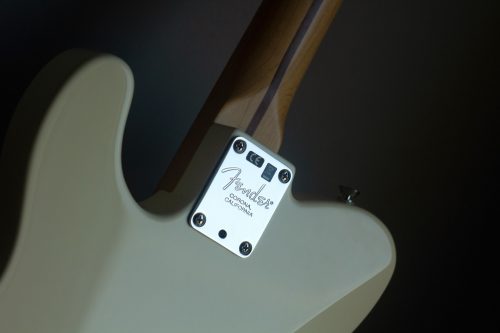
Any guitar that is one solid piece of wood for the body and/or the neck will be of a higher quality than a guitar composed of pressing two or more pieces of wood together. This leads to a higher quality of build for the guitar overall and will influence how the guitar sounds.
5. Proper Action
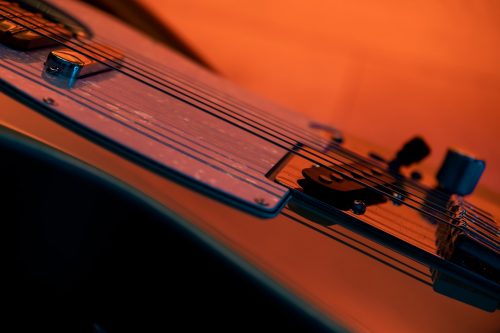
A guitar of higher quality will usually also be able to have more proper action than a guitar of lower quality. Guitars with lower action will be easier to play as it requires less pressure to make chords and notes.
6. Even Frets
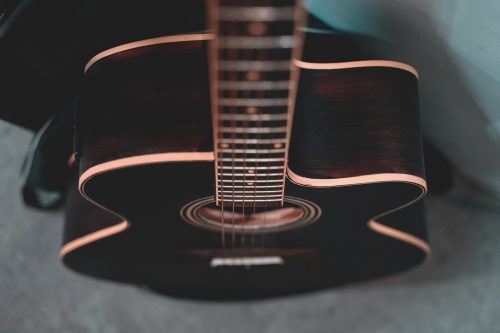
A higher-quality guitar will have its frets aligned at the same height and level. Guitars of lower quality will often have frets at different levels and heights along the neck of the guitar.
Guitars with lower frets will often create a buzzing sound. You can also check the fret levels by placing a finger on each fret and plucking the string to ensure that the right note is being played. There should be no buzzing sound when you do so.
7. Higher quality hardware
Higher-quality guitars will have higher-quality parts and hardware to them. The hardware in this context refers to the pickups and the bridge, nut, and tuning pegs.
Here are some examples of popular types of guitar bridges that are seen on higher-quality guitars. For additional information on each type of bridge, please visit the link below:
- Tune-O-Matic [Fixed]
- Wrap-Around [Fixed]
- Hardtail [Fixed]
- Synchronized [Tremolo Floating]
- Floyde Rose [Tremolo Floating]
- Bigsby [Tremolo Roller]
- Stetsbar [Tremolo Roller]
- Duesenberg Les Trem [Tremolo Roller]
Here are some examples of higher-quality tuning pegs:
- Grover 502 C Roto-Grip.
- Schaller Locking Tuning Machine Heads.
- Fender Locking Tuners.
- Sperzel Trim Lock Tuners.
- Graph Tech PRL-8341-CO.
- D’Addario Auto-Trim Locking Tuning Machines.
- Guyker 6Pcs Guitar Machine Heads.
- Hipshot 6GLO Grip-Lock Locking Guitar Tuning Machines.
8. Better Construction
A guitar of higher quality will have a more solid and well-built construction job to it. It will feel better and be easier and more fun to play. When shopping for guitars, check where the instrument is attached and how solid the attachment is the more solid the attachment, the higher quality the guitar.
Is It Worth Upgrading Cheap Guitar?
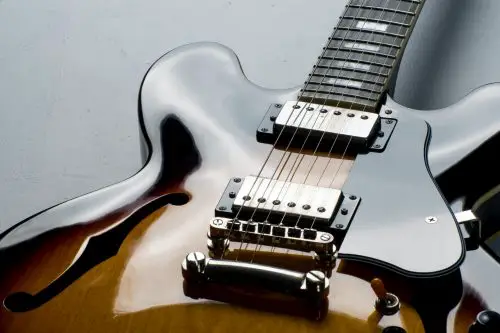
to upgrade a cheap guitar is a risky option
Upgrading cheap guitars with better parts is usually not worth it because there are too many factors and parts that come into play like wood, pickups, strings and even bridge.
That said, this depends on what guitar you have. If your cheap guitars have some good quality parts and need only a few upgrades, then it might be worth it.
Suppose the guitar is designed as one solid piece of wood (solid top), and the guitar is also created from high-quality wood (such as mahogany or rosewood). In that case, buying more expensive parts like pickups, tuning pegs, and a bridge may be worth buying.
However, if the guitar is designed with multiple pieces of wood stuck together (laminate top), it may not be worth upgrading, regardless of the type of wood, it is built with. The wood alone would not make it a high-quality guitar.
If the upgrade cost is just as expensive as purchasing a new high-quality guitar, then it would not be worth the time and effort to do it.
If, however, you can find a used guitar from a private seller that has not been played much and is halfway decent, you may be able to find a guitar at a yard sale or on something like craigslist that you can purchase for its spare parts to upgrade your lower-quality guitar. It depends on what you can find and how much the higher-quality parts you are looking for will cost.
What Type of Guitar Is the Easiest to Play?
Many guitarists find that short-scale electric guitars are usually the easiest to play. This is based on the smaller scale and the lower amount of tension on the strings. However, this will all vary from everyone’s personal experience.
A short-scale guitar will require less distance to move your hands when strumming and forming chords. The lower tension on the guitar strings will also require less pressure against the fretboard, making it a bit easier.
Many guitarists (myself included) will find that it is easier to slide your left hand (assuming this is the hand you make your notes and chords with) up and down a neck that is solid wood as opposed to a neck that has been painted over to match the color of your guitar or bass.
However, this is a matter of opinion. Again, I recommend playing all types of guitars until you find the one that works best for you.
Conclusion
I covered several topics in great detail. These topics included questions h such as Are Nicer (more expensive guitars) easier to play, do expensive guitars really sound better, and do better guitars make you play better?
We also covered specific details and components of both cheap and expensive guitars, if it is worth upgrading a cheap guitar with nicer components (when applicable), and what type of guitar is easiest to play.
Many of your favorite musicians started on cheap, low-quality guitars when they first started learning to play, mainly because this was all that could be afforded at the time.
However, the main driving force in how you play and how skilled of a guitar player you become will all depend on how much time and dedication you put into learning and practicing.
Regardless of what sort of guitar you started playing, it is entirely up to you how good of a guitar you ultimately become.


